傍晚英语 8 《Telling a story》
人教版八年级英语下册复习学案:Unit 6 An old man tried to move a m
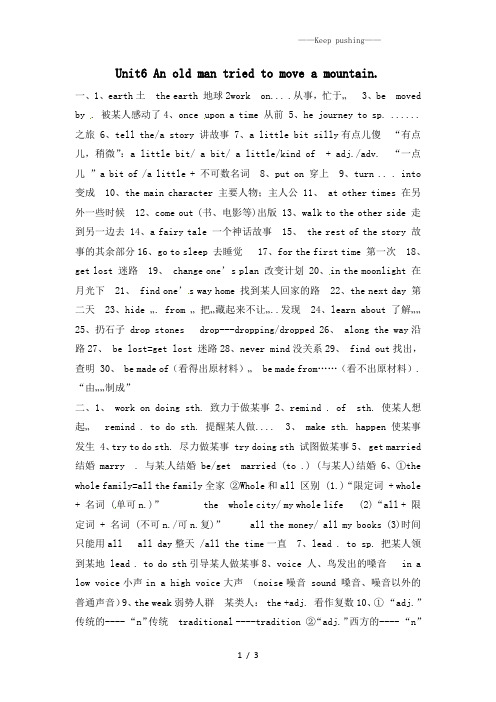
Unit6 An old man tried to move a mountain.一、1、earth土 the earth 地球2work on... .从事,忙于… 3、be moved by . 被某人感动了4、once upon a time 从前 5、he journey to sp. ......之旅 6、tell the/a story 讲故事 7、a little bit silly有点儿傻“有点儿,稍微”:a little bit/ a bit/ a little/kind of + adj./adv. “一点儿”a bit of /a little + 不可数名词 8、put on 穿上 9、turn .. . into 变成 10、the main character 主要人物;主人公 11、 at other times 在另外一些时候 12、come out (书、电影等)出版 13、walk to the other side 走到另一边去 14、a fairy tale 一个神话故事 15、 the rest of the story 故事的其余部分16、go to sleep 去睡觉 17、for the first time 第一次 18、get lost 迷路 19、 change one’s plan 改变计划 20、in the moonlight 在月光下 21、 find one’s way home 找到某人回家的路 22、the next day 第二天 23、hide …. from …把…藏起来不让…..发现 24、learn about了解……25、扔石子 drop stones drop---dropping/dropped 26、 along the way沿路27、 be lost=get lost 迷路28、never mind没关系29、 find out找出,查明 30、 be made of(看得出原材料)… be made from……(看不出原材料).“由……制成”二、1、 work on doing sth. 致力于做某事 2、remind . of sth. 使某人想起… remind . to do sth. 提醒某人做.... 3、 make sth. happen 使某事发生 4、try to do sth. 尽力做某事 try doing sth 试图做某事5、 get married 结婚marry . 与某人结婚 be/get married (to .) (与某人)结婚6、①the whole family=all the family全家②Whole和all 区别 (1.)“限定词 + whole + 名词 (单可n.)” the whole city/ my whole life (2)“all + 限定词 + 名词 (不可n./可n.复)” all the money/ all my books (3)时间只能用all all day整天 /all the time一直 7、lead . to sp. 把某人领到某地 lead . to do sth引导某人做某事8、voice 人、鸟发出的嗓音 in a low voice小声in a high voice大声(noise噪音 sound 嗓音、噪音以外的普通声音)9、the weak弱势人群某类人: the +adj. 看作复数10、①“adj.”传统的---- “n”传统 traditional ----tradition ②“adj.”西方的---- “n”西western ----west③wife----复数wives 11、W hat do you th in k about/of.. . ? 你认为……怎么样12、It doesn’t seem adj . to do sth .. 做某事好像是…… It doesn’t seem very possible to move -a mountain. 把一座山给移掉好像不太可能。
Module8Storytime词句精讲精练

Module8Storytime词句精讲精练Module 8 Story time词句精讲精练1. asleepasleep 是形容词,意为“睡着的” ,但它只能作表语,不能⽤very 修饰,只能⽤much、fast 等词修饰。
它作定语时,只能位于所修饰词之后。
反义词为“awake ”。
例如:Don'ttalk loud when others are asleep. 别⼈睡着的时候不要⼤声说话。
The boy asleep is my brother. 那个睡着的男孩是我弟弟。
【拓展】be asleep、go to sle ep、go to bed 和sleep 的辨析:(1)be asleep表⽰“睡着”的状态。
例如:The baby is fast asleep. 那个婴⼉睡得很熟。
(2)go to sleep = get to sleep = fall asleep 强调进⼊梦乡的动作。
例如:He was just falling asleep when there was a loud knock at the door.他刚睡着,就有⼈使劲敲门。
I don't know when I went to sleep / got to sleep last night. 我不知道昨晚什么时候睡着的。
(3)go to bed意为“就寝,上床睡觉”,着重指上床准备睡觉的动作。
⼀般来说,go to bed在前,然后才go to sleep 或fall asleep。
例如:He usually goes to bed at ten and goes to sleep five minutes later.他通常⼗点上床睡觉,五分钟后⼊睡。
(4)sleep强调“睡觉”动作,是延续性动词,可与表⽰时间段的状语连⽤。
例如:Did you sleep well last night? 你昨晚睡得好吗?2. pickpick意为“采,摘”,常⽤于词组“ pick up ”,意为“拾起,捡起”,当宾语为代词时,宾语应放在pick 和up 中间;当宾语为名词时,宾语可放中间,也可放在后⾯。
八年级上册英语第六单元课文笔记
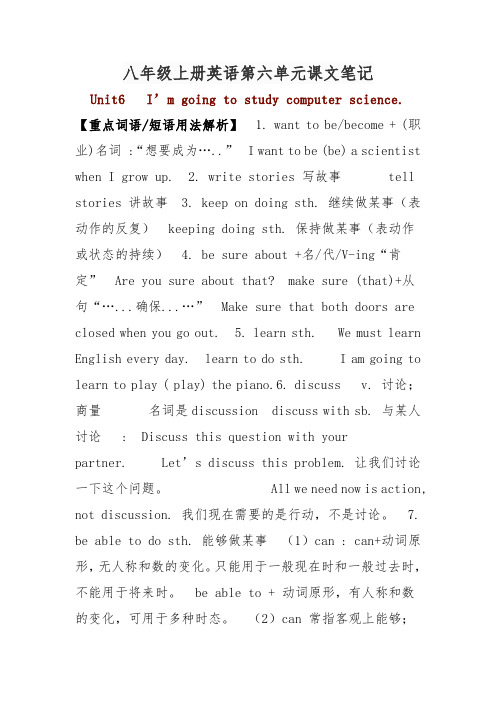
八年级上册英语第六单元课文笔记Unit6 I’m going to study computer science.【重点词语/短语用法解析】 1. want to be/become + (职业)名词 :“想要成为…..”I want to be (be) a scientist when I grow up. 2. write stories 写故事tell stories 讲故事 3. keep on doing sth. 继续做某事(表动作的反复)keeping doing sth. 保持做某事(表动作或状态的持续) 4. be sure about +名/代/V-ing“肯定”Are you sure about that? make sure (that)+从句“…...确保...…”Make sure that both doors are closed when you go out. 5. learn sth. We must learn English every day. learn to do sth. I am going to learn to play ( play) the piano.6. discuss v. 讨论;商量名词是discussion discuss with sb. 与某人讨论: Discuss this question with yourpartner. Let’s discuss this problem. 让我们讨论一下这个问题。
All we need now is action, not discussion. 我们现在需要的是行动,不是讨论。
7. be able to do sth. 能够做某事(1)can : can+动词原形,无人称和数的变化。
只能用于一般现在时和一般过去时,不能用于将来时。
be able to + 动词原形,有人称和数的变化,可用于多种时态。
外研版八年级英语上册 Module 7 A famous story教案

Module 7 A famous story一、学习目标:单词和短语:fall, follow, hole, rabbit, ssh, ground, tea party, twice, once or twice, suddenly, pink, pocket, field, think about, deep, while, land, dry二. 教学目标1. Function: Telling a story2. Structure: Past continuous3. Skills:1) Listening and understanding the plot development of Alice’s Adventures in Wonderland. Understanding the major characters and events.2) Participating in a role-play with the teacher’s guidance.3) Reading and understanding the sequence of events i n Alice’s Adventures in Wonderland.4) Writing a short passage about what happened after Alice fell down the r abbit hole.4. Around the world: Stories5. Task: Writing a short story about your own experience.三、重点及难点:Grammar: Past continuous四、教学设计:Unit 1 Alice was sitting with her sister by the river.ⅠTeaching modelListening and speakingⅡTeaching methodPWP approachⅢTeaching aims1. Key vocabulary: fall, follow, hole, rabbit, ssh, ground, tea party2. Key structures: Past continuous: was / were + v-ingⅣTeaching aidsTape recorder, OHP , videoⅤTeaching StepsStep 1 Warming-up1. Enjoy a play: Alice’s Adventures in Wonderland2. Show some pictures and tell the story: Alice’s Adventures in Wonderland3. Look at the pictures, and talk something about the pictures.4. Introduce the new words.5. Learn the new words.6. Read the new words.Step 2 Listening practice.1. Ask the students to read the words in the box in Activity 1.fall follow hole rabbit strange2. Play the recording once without stopping.3. Listen and underline the correct words.4. Play the recording again and ask the whole class to check with a partner.5. Check the answers:Step 3 Listening practice.1. Ask the students to look at the pictures and read through the sentences in Activity2.2. Play the recording once without stopping.3. Listen and underline the correct words.4. Play the recording again and ask the whole class to check with a partner.5. Check the answers:Step 4 Listen and read.1. Show some pictures, and ask the students to talk about them.2. Ask the students to read the conversation silently.3. Play the recording and ask the students to listen and read the conversation.4. Read the conversation.5. Act it out.6. Learn “Everyday English”1) Ssh!2) Sorry!3) It’s about…Step 5 Complete the sentences.1. Ask the students to read the sentences in the box in Activity 3.2. Read through the sentences.1) Alice was ______ with her ______ by the river.2) The white rabbit with a ______ ran past.3) The Mad Hatter, the March Hareand a mouse were having a ____ party.4) The Queen of Hearts was ______ a strange game.3. Now complete the sentences. Use the words in the box to help you.4. Ask the students to check with a partner.5. Check the answers:Step 6 Complete the sentences.1. Ask the students to read the words in the box in Activity 4.fall hole smile strange watch2. Read through t he sentences.1) Something is ___________ if it is not usual.2) You ___________ when you are happy.3) You can wear a __________. It tells you the time.4) A rabbit ___________ is a place where rabbits live.5) You ___________ when you move down quickly to the ground3. Complete the sentences with the words in the box.4. Ask the students to check with a partner.5. Check the answers:Step 7 Listen and repeat.1. Play the recording once without stopping.2. Play the recording again and ask the whole class to repeat.1) —The Cheshire Cat was sitting on the grass.—No, it wasn’t. It was sitting in a t ree.2)— The white rabbit was looking at its watch.— Yes, it was.3. Now work in pairs. Listen and repeat.Step 8 Work in pairs.1. Ask the students to read the conversations in Activity 6 aloud.2. Do an interview.Student A: You are a school newspape r reporter. You’re interviewing a school basketball star about what he did yesterday.Student B: You are a star on your school basketball team. A school newspaper reporter is interviewing you.— What were you doing at 5 am yesterday?— I was getting up.3. Work in pairs.Step 9 Grammar一般来说,过去进行时是指“过去的某一时间进行发生的动作或事情”。
外研版英语八年级上册Module7《Afamousstory》(Unit2)说课稿
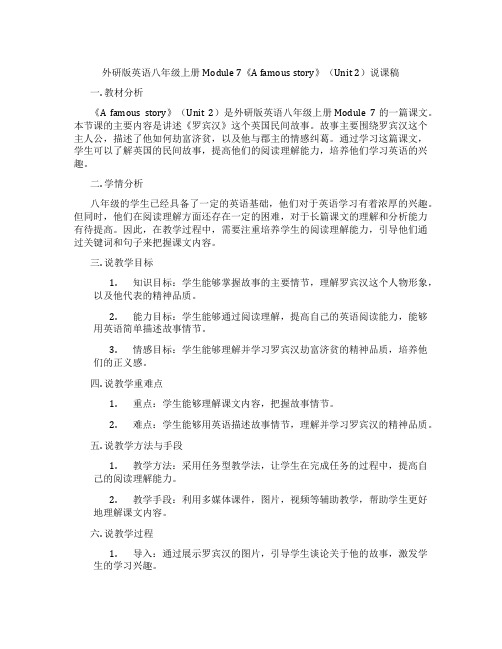
外研版英语八年级上册Module 7《A famous story》(Unit 2)说课稿一. 教材分析《A famous story》(Unit 2)是外研版英语八年级上册Module 7的一篇课文。
本节课的主要内容是讲述《罗宾汉》这个英国民间故事。
故事主要围绕罗宾汉这个主人公,描述了他如何劫富济贫,以及他与郡主的情感纠葛。
通过学习这篇课文,学生可以了解英国的民间故事,提高他们的阅读理解能力,培养他们学习英语的兴趣。
二. 学情分析八年级的学生已经具备了一定的英语基础,他们对于英语学习有着浓厚的兴趣。
但同时,他们在阅读理解方面还存在一定的困难,对于长篇课文的理解和分析能力有待提高。
因此,在教学过程中,需要注重培养学生的阅读理解能力,引导他们通过关键词和句子来把握课文内容。
三. 说教学目标1.知识目标:学生能够掌握故事的主要情节,理解罗宾汉这个人物形象,以及他代表的精神品质。
2.能力目标:学生能够通过阅读理解,提高自己的英语阅读能力,能够用英语简单描述故事情节。
3.情感目标:学生能够理解并学习罗宾汉劫富济贫的精神品质,培养他们的正义感。
四. 说教学重难点1.重点:学生能够理解课文内容,把握故事情节。
2.难点:学生能够用英语描述故事情节,理解并学习罗宾汉的精神品质。
五. 说教学方法与手段1.教学方法:采用任务型教学法,让学生在完成任务的过程中,提高自己的阅读理解能力。
2.教学手段:利用多媒体课件,图片,视频等辅助教学,帮助学生更好地理解课文内容。
六. 说教学过程1.导入:通过展示罗宾汉的图片,引导学生谈论关于他的故事,激发学生的学习兴趣。
2.阅读理解:学生自主阅读课文,回答相关问题,教师引导学生通过关键词和句子来理解课文内容。
3.课文讲解:教师详细讲解课文内容,解释生词和短语,帮助学生更好地理解故事情节。
4.小组讨论:学生分组讨论,用英语描述故事情节,培养他们的口语表达能力。
5.情感教育:引导学生学习罗宾汉劫富济贫的精神品质,培养他们的正义感。
五年级下册英语一课一练 Unit 5 I'm cleaning my room. Lesson 28

人教精通版〔三起点〕2021-2021学年小学英语五年级下册英语Unit 5 I'mcleaning my room. Lesson 28课时练习一、看图选单词。
1.看图选单词A. talkB. runC. puppyD. guitarE. violin〔1〕________〔2〕________〔3〕________〔4〕________〔5〕________二、选出不同类的一项。
2.选出不同类的一项〔〕A. puppyB. catC. bearD. story3.选出不同类的一项〔〕A. musicB. guitarC. pianoD. violin4.选出不同类的一项〔〕A. tellB. singC. playD. song5.选出不同类的一项〔〕A. themB. heC. sheD. you6.选出不同类的一项〔〕A.singB.tellingC.runningD.talking三、把左右相匹配7.把左右相匹配⑴play the guitar ________ A.讲故事⑵tell a story ________ B. 唱歌⑶sing a song ________ C.拉小提琴⑷play the violin ________ D.弹吉他⑸all the fun ________ E.所有的乐趣四、按要求写单词。
8.按要求写单词〔1〕tell(如今分词〕________〔2〕talk(如今分词〕________〔3〕sing(如今分词〕________〔4〕do(如今分词〕________〔5〕want(单三形式〕________五、单项选择。
9.The puppy_____ to come.A. wantB. wantsC. like10.He _____ telling a story.A. isB. areC. does11.I am _____.A. singB. singsC. singing12.She's sing ____ song.A. aB. theC. an13.What are you _____?A. doB. doingC. does六、根据所给图片,选择正确选项。
英语八年级下Unit6-An-old-man-tried-to-move-the-mountains知识点及练习题

重点、难点
考点及考试要求
连词 unless, as soon as, so... that 引导的状语从句
教学内容 Unit6 An old man tried to move the mountains.
一. 重点短语 1. work on doing sth. 致力于做某事 2. as soon as ...... 一……就….... 3. once upon a time 从前 4. continue to do sth. 继续做某事 5. make sth. happen 使某事发生 6.try to do sth. 试图做某事 7. the journey to sp. ......之旅 8. tell the/a story 讲故事 9. put on 穿上 10. a little bit 有点儿 11. keep doing sth. 坚持做某事 12. give up 放弃 13. instead of 代替;反而 14. turn .. . into 变成 15. get married 结婚 16. the main character 主要人物;主人公 17. at other times 在另外一些时候 18. be able to 能;会 19. come out (书、电影等)出版 20. become interested in. 对……感兴趣 21. walk to the other side 走到另一边去
xx 教育学科教师辅导讲义
学员编号:xxx 学员姓名: 课 授课时间: 教学目标 题
年
级:八年级 辅导科目:英语
课时数:x 学科教师:xxx
Unit6 An old man tried to move the mountains. 备课时间: Legends and stories. Tell a story. Conjunctions unless, as soon as and so...that
Telling-a-story-in-English

Learning aims
Knowledge aim:
Frog/toy/hear/cry/round/leaf/come back/playground/rise/shadow/wake up
Ability aim: Be able to tell an English stories.
3
A Frog Looks For His Toy
Telling a story in English
1
My dear students, can you tell any Chinese stories? You may say “Yes, I could do that when I was two years old!” But what about English stories?
A little frog wakes up in the morning. He can’t find his toy, he is crying.
A fish hears and comes. He asks, “Why are you crying?” The frog answers, “I lost my toy.” “What is your toy?” “I don’t know its name, but it’s round and yellow.” The fish says, “I know, I know.” Quickly, he comes back with a yellow leaf. “No, no, That’s not my toy.” The frog still cries.
A dog is coming, “A round and yellow thing is on the playground. That must be your toy.” The frog sees, that is not his toy, too. It’s a yellow ball.
中学英语口语课教案
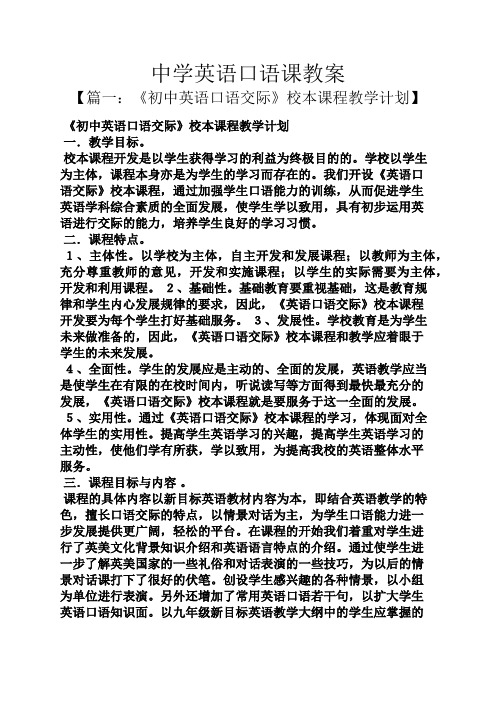
中学英语口语课教案【篇一:《初中英语口语交际》校本课程教学计划】《初中英语口语交际》校本课程教学计划一.教学目标。
校本课程开发是以学生获得学习的利益为终极目的的。
学校以学生为主体,课程本身亦是为学生的学习而存在的。
我们开设《英语口语交际》校本课程,通过加强学生口语能力的训练,从而促进学生英语学科综合素质的全面发展,使学生学以致用,具有初步运用英语进行交际的能力,培养学生良好的学习习惯。
二.课程特点。
1、主体性。
以学校为主体,自主开发和发展课程;以教师为主体,充分尊重教师的意见,开发和实施课程;以学生的实际需要为主体,开发和利用课程。
2、基础性。
基础教育要重视基础,这是教育规律和学生内心发展规律的要求,因此,《英语口语交际》校本课程开发要为每个学生打好基础服务。
3、发展性。
学校教育是为学生未来做准备的,因此,《英语口语交际》校本课程和教学应着眼于学生的未来发展。
4、全面性。
学生的发展应是主动的、全面的发展,英语教学应当是使学生在有限的在校时间内,听说读写等方面得到最快最充分的发展,《英语口语交际》校本课程就是要服务于这一全面的发展。
5、实用性。
通过《英语口语交际》校本课程的学习,体现面对全体学生的实用性。
提高学生英语学习的兴趣,提高学生英语学习的主动性,使他们学有所获,学以致用,为提高我校的英语整体水平服务。
三.课程目标与内容。
课程的具体内容以新目标英语教材内容为本,即结合英语教学的特色,擅长口语交际的特点,以情景对话为主,为学生口语能力进一步发展提供更广阔,轻松的平台。
在课程的开始我们着重对学生进行了英美文化背景知识介绍和英语语言特点的介绍。
通过使学生进一步了解英美国家的一些礼俗和对话表演的一些技巧,为以后的情景对话课打下了很好的伏笔。
创设学生感兴趣的各种情景,以小组为单位进行表演。
另外还增加了常用英语口语若干句,以扩大学生英语口语知识面。
以九年级新目标英语教学大纲中的学生应掌握的功能意念项目为依托,进行全面综合地训练,同时增加美国英语俚语、英语谚语、谚语名人名言、英语幽默与笑话欣赏等项目。
专八听力story telling 答案
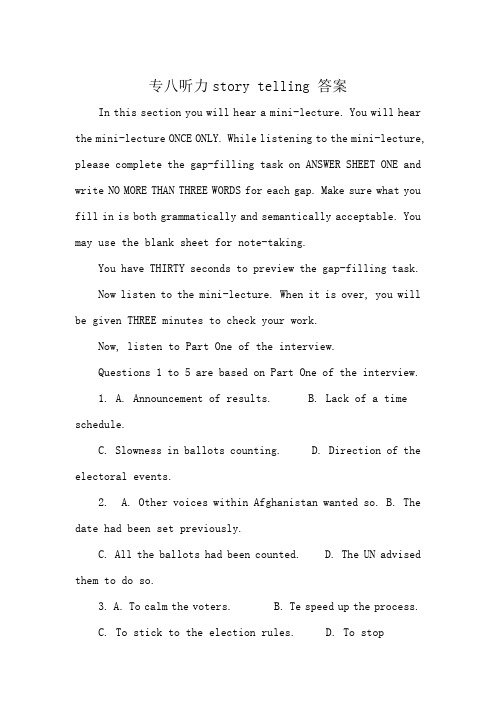
专八听力story telling 答案In this section you will hear a mini-lecture. You will hear the mini-lecture ONCE ONLY. While listening to the mini-lecture, please complete the gap-filling task on ANSWER SHEET ONE and write NO MORE THAN THREE WORDS for each gap. Make sure what you fill in is both grammatically and semantically acceptable. You may use the blank sheet for note-taking.You have THIRTY seconds to preview the gap-filling task.Now listen to the mini-lecture. When it is over, you will be given THREE minutes to check your work.Now, listen to Part One of the interview.Questions 1 to 5 are based on Part One of the interview.1. A. Announcement of results. B. Lack of a time schedule.C. Slowness in ballots counting.D. Direction of the electoral events.2. A. Other voices within Afghanistan wanted so. B. The date had been set previously.C. All the ballots had been counted.D. The UN advised them to do so.3. A. To calm the voters. B. Te speed up the process.C. To stick to the election rules.D. To stopcomplaints from the loser.4. A. Unacceptable. B. Unreasonable. C. Insensible.D. Ill considered.5. A. Supportive. B. Ambivalent. C. Opposed. D. Neutral.Now, listen to Part Two of the interview.Questions 6 to 10 are based on Part Two of the interview.6. A. Ensure the government includes all parties. B. Discuss who is going to be the winner.C. Supervise the counting of votes.D. Seek support from important sectors.7. A. 36%-24%. B. 46%-34% C. 56%-44%. D.66%-54%.8. A. Both candidates. B. Electoral institutions. C. The United Nations. D. Not specified.9. A. It was unheard of. B. It was on a small scale.C. It was insignificant.D. It occurred elsewhere.10. A. Problems in the electoral process. B. Formation of a new government.C. Premature announcement of results.D. Democracy in Afghanistan.二、听力原文:MINI-LECTURE原文:Language and HumanityGood morning, everyone.In today's lecture, we're going to discuss the relationship between language and humanity. As we all know, language is very powerful.It allows you to put a thought from your mind directly in someone else's mind.Languages are like genes talking, getting things they want.And you just imagine the sense of wonder in a baby when it first discovers that, merely by uttering a sound, it can get objects to move across a room as if by magic, and maybe even into its mouth.Now we need to explain how and why this remarkable trait, you know, human's ability to do things with language, has evolved, and why did this trait evolve only in our species?In order to get an answer to the question, we have to go to tool use in the chimpanzees.Chimpanzees can use tools, and we take that phenomenon as a sign of their intelligence.But if they really were intelligent, why would they crack open nuts with a rock?Why wouldn't they just go to a shop and buy a bag of nuts that somebody else had already cracked open for them?Why not? I mean, that's what we do.The reason the chimpanzees don't do that is that they lack what psychologists and anthropologists call social learning.That is, they seem to lack the ability to learn from others by copying or imitating or simply watching.As a result, they can't improve on others' ideas, learn from others' mistakes, or even benefit from others' wisdom.And so they just do the same thing over and over and over again.In fact, we could go away for a million years and come back and these chimpanzees would be doing the same thing with the same rocks to crack open the nuts.Okay, so what this tells us is that, contrary to the old saying, "monkey see, monkey do," the surprise really is that all of the other animals really cannot do that -- at least not very much.But by comparison, we humans can learn.We can learn by watching other people and copying or imitating what they can do.We can then choose, from among a range of options available,the best one.We can benefit from others' ideas. We can build on their wisdom.And as a result, our ideas do accumulate, and our technology progresses.And this cumulative cultural adaptation, as anthropologists call this accumulation of ideas, is responsible for everything around you in your bustling and teeming everyday life.I mean the world has changed out of all proportion to what we would recognize even 1,000 or 2,000 years ago.And all of this is because of cumulative cultural adaptation.For instance, the chairs you're sitting in today, the lights in this lecture hall, my microphone, the iPads and the smart phones that you carry around with you -- all are a result of cumulative cultural adaptation.But, our acquisition of social learning would create an evolutionary dilemma, and the solution to the dilemma, it's fair to say, would determine not only the future course of our psychology, but the future course of the entire world.And most importantly for this, it'll tell us why we havelanguage.And the reason that dilemma arose is, it turns out, that social learning is visual theft.What I mean is, if I can learn by watching you, I can steal your best ideas, and I can benefit from your efforts, without having to put in the same time and energy that you did into developing them.Social learning really is visual theft.And in any species that acquired it, it would encourage you to hide your best ideas, lest somebody steal them from you.And so some time around 200,000 years ago, our species confronted this crisis.And we chose to develop the systems of communication that would allow us to share ideas and to cooperate amongst others.Choosing this option would mean that a vastly greater fund of knowledge and wisdom would become available to any one individual than would ever arise from within an individual family or an individual person on their own.Well, language is the result.Language evolved to solve the crisis of visual theft.Language is a piece of social technology for enhancing the benefits of cooperation -- for reaching agreements, forstriking deals and for coordinating our activities.And you can see that, in a developing society that was beginning to acquire language, not having language would be like a bird without wings.As I said at the beginning, language really is the voice of our genes.But, as we spread out around the world, we developed thousands of different languages.Currently, there are about seven or eight thousand different languages spoken on Earth. And then another problem occurred.It seems that we use our language, not just to cooperate, but to draw rings around our cooperative groups and to establish identities, and perhaps to protect our knowledge and wisdom and skills from being stolen from outside.And we know this because when we study different language groups and associate them with their cultures, we see that different languages slow the flow of ideas between groups.Okay, this tendency we have, this seemingly natural tendency we have, goes towards isolation, towards keeping everything to ourselves, whereas our modern world is communicating with itself and with each other more than it hasat any time in its past.And that communication, that connectivity around the world, that globalization now raises a burden.Because these different languages impose a barrier, as we've just seen, to the transfer of goods and ideas and technologies and wisdom.And they impose a barrier to cooperation. What will be the solution?In a world in which we want to promote cooperation and exchange, and in a world that might be dependent more than ever before on cooperation to maintain and enhance our levels of prosperity,I think it might be inevitable that we have to confront the idea that our destiny is to be one world with one language.What do you think of the solution? Okay.In today's lecture, I have presented to you how language shapes our humanity, what kind of dilemma social learning has created, and the possible solutions to the dilemma.In our next lecture, I am going to talk about lingua franca and its functions.Interview原文W: Good evening listeners, this is BBC. Today, we are verydelighted to have invited James Dobbins, US special representative for Afghanistan, to tell us the electoral process in Afghanistan currently. Well, James, how are you reading what's happening in Afghanistan at the moment?M: We're concerned about the trend in events. We have been concerned for some time that the electoral process hasn't been moving forward smoothly. We believe there needs to be a powerful and transparent audit of potentially dishonest ballots and we're sorry that hasn't moved forward quickly and substantially enough. We regret the preliminary announcement of results that was made yesterday. We think that was premature given that there are still a number of ballots that need to be examined and there's not yet a clear agreement on how best to do so. We do believe that...W: Forgive me for interrupting, James. Can I ask you why you think that announcement was made yesterday?M: I think it was made because the electoral institutions had previously set that date and they held to it despite advice to the contrary from the UN, from the United States, and from other voices within Afghanistan, and we think that was unfortunate.W: Is there another reason that could be slightly morefavorable, that is, they wanted to prepare the ground because if they just came out with one final result at the end of all this then it can be pretty likely that the loser, whoever it was going to be, was going to complain because they think it is unfair?M: I think it's our view that they didn't have a basis for preparing the ground because there's such a large number of votes that still need to be examined and that therefore any preliminary result might be more misleading than preparing the ground.W: In terms now of where this goes, we've already heard some very strong, very emotional language from the camp of the man who appears to be on the losing side of all this, Dr. Abdullah Abdullah. What have you been saying to him in order to try and calm those feelings?M: Well, we have heard talk about establishing a parallel presidency. We made clear that the United States and its partners are not in a position to support a divided Afghanistan. That any effort to establish a parallel presidency would make it impossible for the United States and its partners to continue their financial, economic and military support, and that the consequences for the country would be potentially quiteterrible. Clearly, this is not something the Afghan population wants. It's not something they were voting for. And it's not something that they expect to happen, but it could be the consequences of an ill-considered action.This is the end of Part One of the interview.Questions 1 to 5 are based on what you have just heard.1. Which aspect of the election event is the interviewee most concerned about?2. Why was the announcement made yesterday, according to the interviewee?3. According to the BBC interviewer, why did the electoral institutions want to prepare the ground?4. What did the interviewee think of the BBC's reason of preparing the ground?5. What is the interviewee's attitude towards establishinga parallel presidency?W: Let me turn it on to the man who may end up the winner, Mr. Ashraf Ghani. What pressure, if any, are you trying to bring on him to ensure that whatever happens he tried to include Abdullah Abdullah, or Abdullah Abdullah's people in any future government?M: We're not making any assumptions about who might be thewinner or who might be the loser, and we think it's premature for anybody to be doing so. We've made clear to both candidates that two things need to happen. First of all, there needs to be a robust and transparent process for determining the winner, and there's still a good deal of work to be done there. And secondly, we believe that both candidates need to begin discussing the formation of a government that would have the support of all important components and elements within the country, a government of national unity that would ensure that all of the significant sectors of Afghan society feel included.W: You're saying it's all a bit hasty to say whether one side or the other has won or lost. It is difficult, is it not, to see this result being overturned? This is a flat margin of victory at the moment -- 56 percent to 44 percent. It would be extraordinary to see the result overturned in the space of a couple of weeks.M: I think both candidates have agreed that there was extensive fraud in the electoral process. Both candidates have agreed that the suspect ballots need to be audited. They haven't agreed on exactly how to go about that. We believe it's the responsibility of the electoral institutions to go ahead and conduct that kind of broad audit, whether or not the candidateshave agreed on every precise element of the process, they will have to do it. And we believe until they've done so it's premature to be coming to any judgments.W: It is worrying though, isn't it? I suppose it was all too predictable that democracy is an imperfect thing in Afghanistan and that undoubtedly there has been fraud, we've heard all sorts of reports that project there have been a measure of fraud, and whoever was going to lose in this election was going to say it's been by unfair means.M: I agree with you that Afghanistan is a relatively new democracy. The countries at this stage of democratic development often have difficulties of this sort. That there's not a tradition of good losers in societies at this level of political development. And in that sense, the problem we face is not unparalleled. There are other countries who have gone through similar difficulties. Nevertheless, the fact is that millions of Afghans went out and voted in the expectation that their vote would count. The numerous polls indicate that most Afghans are prepared to support either candidate as the victor. That most Afghans have said that they could accept the person they didn't vote for winning the election if that was the result. So while the problems we face are not unparalleled, the Afghanvoters expect something better.W: James, I'm so grateful to you. I hugely appreciate you answering it and answering all the other questions as well.M: Pleasure.This is the end of Part Two of the interview.Questions 6 to 10 are based on what you have just heard.6. What did the interviewee think both candidates need to do?7. What was the margin of victory at the time of the interview?8. Who should be responsible for dealing with fraud in the election?9. What does the interviewee think of the problem in the Afghan election?10. What is the interview mainly about?三、参考答案:Part I LISTENING COMPREHENSION—Section A Mini-lecture1. our species/ human beings/ humans2. (their) intelligence3. learn (from others)4. repeat5. (other’s) wisdom6. accumulate7. evolutionary dilemmas8. watching and copying/ imitating 9. systems ofcommunication 10. knowledge and wisdom11. (benefits of) cooperation 12. establishment of identities 13. isolation14. communication/ cooperation 15. Different languagesSection B Interview 1-5 DBDDC 6-10 DCBDA1. Which aspect of the election event is the interviewee most concerned about?答案 D. Direction of the electoral events.2,Why was the announcement made yesterday according to the interviewee?答案 B. The date had been set previously.3. According to the BBC Interviewer, why did the electoral institutions want to prepare theground?答案 D. To stop complaints from the loser.4. What did the interviewee think of the BBC’s reason of preparing the ground?答案 D. Ill considered.5. What is the interviewee's attitude towards establishinga parallel presidency?答案 C. Opposed.6. What does the interviewee think by the candidates needto do?答案 D. Seek support from important sectors7. What was the margin of victory at the time of interview?答案 C. 56 ~448. Who should be responsible for dealing with fraud in the election?答案 B. Electoral institutions.9.What does the interviewee think of the problem In the Afghanistan election?答案 D. It occurred elsewhere.10. What is the interview mainly about?答案 A. Problems in the electoral process.。
寒假预习人教版(新目标)八年级英语下册Unit6预习资料
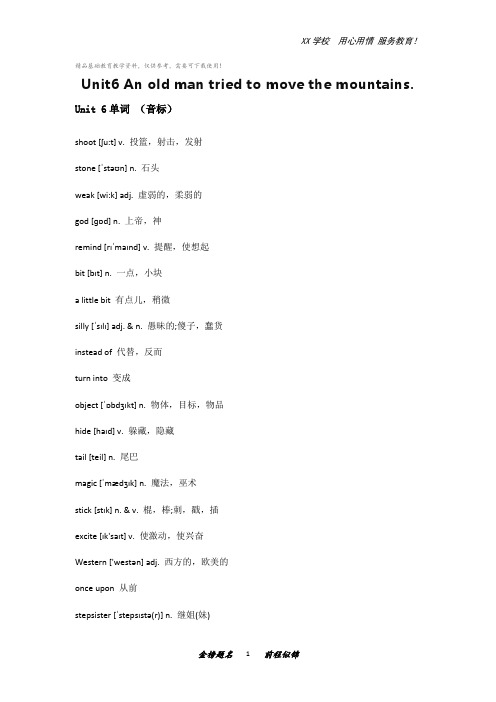
精品基础教育教学资料,仅供参考,需要可下载使用!Unit6 An old man tried to move the mountains. Unit 6单词(音标)shoot [ʃu:t] v. 投篮,射击,发射stone [ˈstəʊn] n. 石头weak [wi:k] adj. 虚弱的,柔弱的god [ɡɒd] n. 上帝,神remind [rɪˈmaɪnd] v. 提醒,使想起bit [bɪt] n. 一点,小块a little bit 有点儿,稍微silly [ˈsɪlɪ] adj. & n. 愚昧的;傻子,蠢货instead of 代替,反而turn into 变成object [ˈɒbdʒɪkt] n. 物体,目标,物品hide [haɪd] v. 躲藏,隐藏tail [teil] n. 尾巴magic [ˈmædʒɪk] n. 魔法,巫术stick [stɪk] n. & v. 棍,棒;刺,戳,插excite [ɪk'saɪt] v. 使激动,使兴奋Western ['westən] adj. 西方的,欧美的once upon 从前stepsister [ˈstepsɪstə(r)] n. 继姐(妹)prince [prɪns] n. 王子fall in love 爱上,喜欢上fit [fɪt] v. 适合,合身couple ['kʌpl] n. (尤指)夫妻,两人smile [smaɪl] n.& v. 微笑marry [ˈmæri] v. 与某人结婚get married 结婚gold [ɡəʊld] n. 黄金,金币emperor [ˈempərə] n. 皇帝silk [sɪlk] n. 丝绸underwear [ˈʌndəwɛə] n. 内衣nobody [ˈnəʊbədi] pron. 无人,没有任何人,谁也不stupid ['stju:pɪd] adj. & n. 愚蠢的,傻的;傻子cheat [tʃi:t] v. 欺骗,愚弄stepmother [ˈstepmʌðə(r)] n. 继母wife [waɪf] n. 妻子husband [ˈhʌzbənd] n. 丈夫whole [həul] adj. 全部的,整体的scene [si:n] n. 舞台,(戏剧)场景moonlight ['mu:nlaɪt] n. 月光shine [ʃaɪn] v. 照耀,发光bright [braɪt] adj. & adv. 明亮的,发亮的;明亮地ground [graʊnd] n. 地面lead [li:d] n.& v. 领导,主角;带路voice [vɔis] n. 嗓音brave [breiv] adj. 勇敢的Claudia 克劳迪娅(女名)Journey to the West 《西游记》the Monkey King 美猴王Sleeping Beauty 《睡美人》Cinderella 《灰姑娘》Little Red Riding Hood 《小红帽》Hansel and Gretel 《韩赛尔与格雷特》(《糖果屋》)Unit6 知识梳理【重点短语】1. work on doing sth. 致力于做某事2. as soon as ... 一……就…....3. once upon a time 从前4. continue to do sth. 继续做某事5. make sth. happen 使某事发生6.try to do sth. 努力做某事7. the journey to sp. ......之旅8. tell the/a story 讲故事9. put on 穿10. a little bit 有点儿11. keep doing sth. 坚持做某事12. give up 放弃13. instead of 代替;反而14. turn...into... 使......变成......15. get married 结婚16. the main character 主要人物;主人公17. at other times 在另外一些时候18. be able to 能;会19. come out (书、电影等)出版20. become interested in... 对……感兴趣21. walk to the other side 走到另一边去22. a fairy tale 一个神话故事23. the rest of the story 故事的其余部分24. leave sb. to do sth. 让某人做某事25. make a plan to do sth. 筹划/计划做某事26. go to sleep 去睡觉27. lead sb. to sp. 把某人领到某地28. get lost 迷路29. change one’s plan 改变计划30. tell sb. to do sth. 叫某人做某事31. in the moonlight 在月光下32. find one’ s way home 找到某人回家的路33. the next day 第二天34. send sb. to sp. 派某人去某地35. so...that... 如此.......以致于.......【重点句型】1.So what do you think about the story of Yu Gong? 你觉得愚公的故事怎么样?2. It doesn't seem very possible to move a mountain. 把一座山给移掉好像不太可能。
外研社七年级英语下册 模块8 Story time知识点归纳

外研社七年级英语下册模块8 Story time知识点归纳知识点一:模块8的短语1.once upon a time从前2.go for a walk散步3.all alone独自一人的4.pick up拿起5.again and again一次又一次6.be lost迷路7.begin with以……开头8.look around环顾四周9.knock on the door敲门10.in pieces破碎11.point at指着……12.at first起初,首先13.change into变成14.jump out of bed从床上跳下来15.hurry out of从……冲出知识点二:重点词语解释Unit one1.Once upon a time…从前……once upon a time意为“从前;很久以前”,相当于long long ago,用于故事的开头。
如:1.Once upon a time there was a village.=Long long ago there was a village.从前有一个村庄。
2.She decided to go for a walk in the park with her basket.她决定带着篮子去公园里散步。
They decided to finish the work on time.他们决定按时完成工作。
3.All alone in the dark, dark forest, Goldilocks picked some flowers.金凤花姑娘独自一人在漆黑的森林里,摘了些花。
all alone意为“独自一人的”,如:He was all alone.他单独一个人。
[辨析]alone,lonelyalone“单独,独自”;lonely“寂寞的,孤独的”,如:Though she is alone at home, she doesn’t feel lonely. She has many things to do.尽管她独自一人在家,她并不觉得孤单,她有很多事情要做。
story-telling(a)
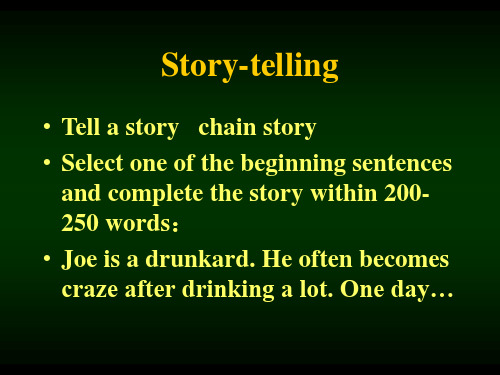
Story-telling
• Mr Lee was in bed and was trying to go to sleep when he heard the bell ring. He turned on the light and looked at his clock. It was half past twelve. “Who can it be at this time of the night?” He wondered. He decided to go and find out. So he got out of bed, put on his dressing gown and went to the door. • When he opened the door, there was nobody there. “That’s very odd,” he thought. Then he went back to his bedroom, took off his dressing gown, got back into bed, turned off the night and tried to go to sleep again.
Story-telling
• It was midnight and suddenly there was a knock at the door. I opened the door and found no one there.
Story-telling
• My Strange Experience • It was around ten o’clock when I came back from work. While I was waiting anxiously at the bus stop… • (rats / the last bus / wind / broken glass / a woman in red / “Don’t look behind.” / sweat)
人教版丨八年级下册英语第6单元单词,短语,句型,话题写作

人教版丨八年级下册英语第6单元单词/短语/句型/话题写作Unit 6单词(音标)shoot [ʃu:t] v. 投篮,射击,发射stone [ˈstəʊn] n. 石头weak [wi:k] adj. 虚弱的,柔弱的god [ɡɒd] n. 上帝,神remind [rɪˈmaɪnd] v. 提醒,使想起bit [bɪt] n. 一点,小块a little bit 有点儿,稍微silly [ˈsɪlɪ] adj. & n. 愚昧的;傻子,蠢货instead of 代替,反而turn into 变成object [ˈɒbdʒɪkt] n. 物体,目标,物品hide [haɪd] v. 躲藏,隐藏tail [teil] n. 尾巴magic [ˈmædʒɪk] n. 魔法,巫术stick [stɪk] n. & v. 棍,棒;刺,戳,插excite [ɪk'saɪt] v. 使激动,使兴奋Western ['westən] adj. 西方的,欧美的once upon 从前stepsister [ˈstepsɪstə(r)] n. 继姐(妹) prince [prɪns] n. 王子fall in love 爱上,喜欢上fit [fɪt] v. 适合,合身couple ['kʌpl] n. (尤指)夫妻,两人smile [smaɪl] n.& v. 微笑marry [ˈmæri] v. 与某人结婚get married 结婚gold [ɡəʊld] n. 黄金,金币emperor [ˈempərə] n. 皇帝silk [sɪlk] n. 丝绸underwear [ˈʌndəwɛə] n. 内衣nobody [ˈnəʊbədi] pron. 无人,没有任何人,谁也不stupid ['stju:pɪd] adj. & n. 愚蠢的,傻的;傻子cheat [tʃi:t] v. 欺骗,愚弄stepmother [ˈstepmʌðə(r)] n. 继母wife [waɪf] n. 妻子husband [ˈhʌzbənd] n. 丈夫whole [həul] adj. 全部的,整体的scene [si:n] n. 舞台,(戏剧)场景moonlight ['mu:nlaɪt] n. 月光shine [ʃaɪn] v. 照耀,发光bright [braɪt] adj. & adv. 明亮的,发亮的;明亮地ground [graʊnd] n. 地面lead [li:d] n.& v. 领导,主角;带路voice [vɔis] n. 嗓音brave [breiv] adj. 勇敢的Claudia 克劳迪娅(女名)Journey to the West 《西游记》the Monkey King 美猴王Sleeping Beauty 《睡美人》Cinderella 《灰姑娘》Little Red Riding Hood 《小红帽》Hansel and Gretel 《韩赛尔与格雷特》(《糖果屋》) Unit6 知识梳理【重点短语】1. work on doing sth. 致力于做某事2. as soon as ... 一……就…....3. once upon a time 从前4. continue to do sth. 继续做某事5. make sth. happen 使某事发生6.try to do sth. 努力做某事7. the journey to sp. ......之旅8. tell the/a story 讲故事9. put on 穿10. a little bit 有点儿11. keep doing sth. 坚持做某事12. give up 放弃13. instead of 代替;反而14. turn...into... 使......变成......15. get married 结婚16. the main character 主要人物;主人公17. at other times 在另外一些时候18. be able to 能;会19. come out (书、电影等)出版20. become interested in... 对……感兴趣21. walk to the other side 走到另一边去22. a fairy tale 一个神话故事23. the rest of the story 故事的其余部分24. leave sb. to do sth. 让某人做某事25. make a plan to do sth. 筹划/计划做某事26. go to sleep 去睡觉27. lead sb. to sp. 把某人领到某地28. get lost 迷路29. change one’s plan 改变计划30. tell sb. to do sth. 叫某人做某事31. in the moonlight 在月光下32. find one’s way home 找到某人回家的路33. the next day 第二天34. send sb. to sp. 派某人去某地35. so...that... 如此.......以致于.......【重点句型】1.So what do you think about the story of Yu Gong? 你觉得愚公的故事怎么样?2. It doesn't seem very possible to move a mountain. 把一座山给移掉好像不太可能。
尽管这篇短篇故事的标题叫作《讲故事的人》(THESTORY-TELLER...
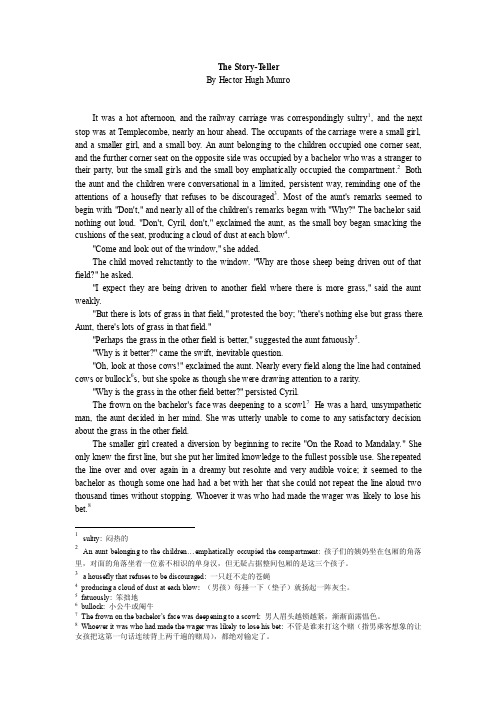
The Story-T ellerBy Hector Hugh MunroIt was a hot afternoon, and the railway carriage was correspondingly sultry1, and the next stop was at Templecombe, nearly an hour ahead. The occupants of the carriage were a small girl, and a smaller girl, and a small boy. An aunt belonging to the children occupied one corner seat, and the further corner seat on the opposite side was occupied by a bachelor who was a stranger to their party, but the small girls and the small boy emphatically occupied the compartment.2Both the aunt and the children were conversational in a limited, persistent way, reminding one of the attentions of a housefly that refuses to be discouraged3. Most of the aunt's remarks seemed to begin with "Don't," and nearly all of the children's remarks began with "Why?" The bachelor said nothing out loud. "Don't, Cyril, don't," exclaimed the aunt, as the small boy began smacking the cushions of the seat, producing a cloud of dust at each blow4."Come and look out of the window," she added.The child moved reluctantly to the window. "Why are those sheep being driven out of that field?" he asked."I expect they are being driven to another field where there is more grass," said the aunt weakly."But there is lots of grass in that field," protested the boy; "there's nothing else but grass there. Aunt, there's lots of grass in that field.""Perhaps the grass in the other field is better," suggested the aunt fatuously5."Why is it better?" came the swift, inevitable question."Oh, look at those cows!" exclaimed the aunt. Nearly every field along the line had contained cows or bullock6s, but she spoke as though she were drawing attention to a rarity."Why is the grass in the other field better?" persisted Cyril.The frown on the bachelor's face was deepening to a scowl.7He was a hard, unsympathetic man, the aunt decided in her mind. She was utterly unable to come to any satisfactory decision about the grass in the other field.The smaller girl created a diversion by beginning to recite "On the Road to Mandalay." She only knew the first line, but she put her limited knowledge to the fullest possible use. She repeated the line over and over again in a dreamy but resolute and very audible voice; it seemed to the bachelor as though some one had had a bet with her that she could not repeat the line aloud two thousand times without stopping. Whoever it was who had made the wager was likely to lose his bet.81sultry: 闷热的2An aunt belonging to the children…emphatically occupied the compartment: 孩子们的姨妈坐在包厢的角落里,对面的角落坐着一位素不相识的单身汉,但无疑占据整间包厢的是这三个孩子。
tellingastory英语作文
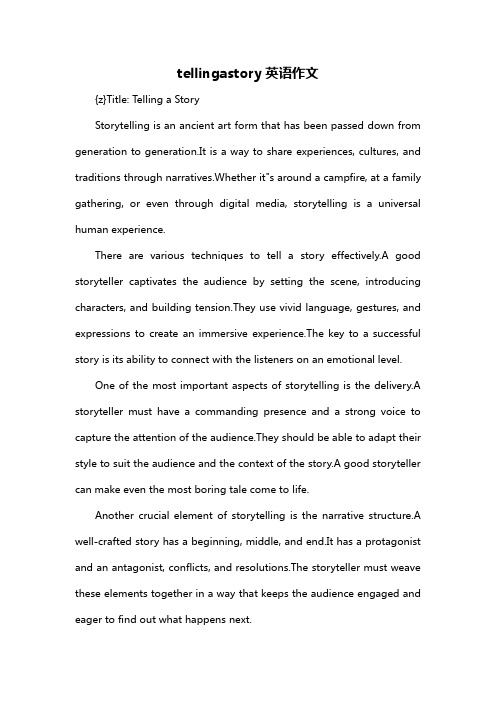
tellingastory英语作文{z}Title: Telling a StoryStorytelling is an ancient art form that has been passed down from generation to generation.It is a way to share experiences, cultures, and traditions through narratives.Whether it"s around a campfire, at a family gathering, or even through digital media, storytelling is a universal human experience.There are various techniques to tell a story effectively.A good storyteller captivates the audience by setting the scene, introducing characters, and building tension.They use vivid language, gestures, and expressions to create an immersive experience.The key to a successful story is its ability to connect with the listeners on an emotional level.One of the most important aspects of storytelling is the delivery.A storyteller must have a commanding presence and a strong voice to capture the attention of the audience.They should be able to adapt their style to suit the audience and the context of the story.A good storyteller can make even the most boring tale come to life.Another crucial element of storytelling is the narrative structure.A well-crafted story has a beginning, middle, and end.It has a protagonist and an antagonist, conflicts, and resolutions.The storyteller must weave these elements together in a way that keeps the audience engaged and eager to find out what happens next.Storytelling is not just about entertaining; it also has educational value.Many cultures use storytelling as a way to teach morals, values, and life lessons.Through stories, children learn about the world, their culture, and how to behave in different situations.In conclusion, storytelling is a powerful tool that can be used to entertain, educate, and connect with others.It is an art form that requires skill, practice, and a deep understanding of human emotions.Whether it"s through spoken word, written text, or digital media, storytelling is a universal language that transcends boundaries and brings people together.。
telling a story英语作文
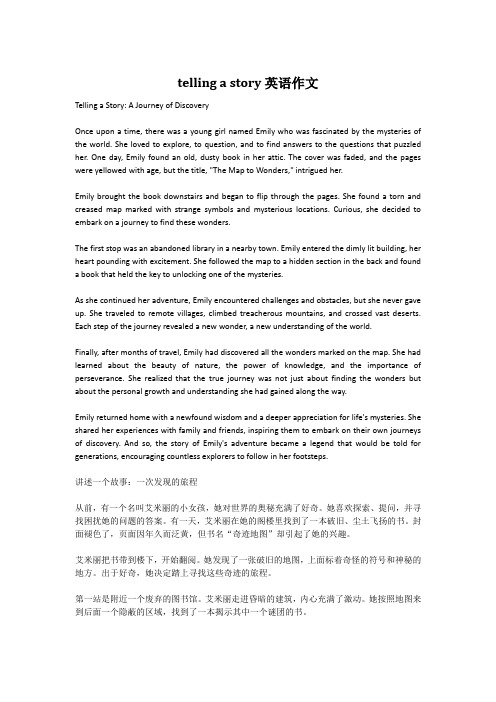
telling a story英语作文Telling a Story: A Journey of DiscoveryOnce upon a time, there was a young girl named Emily who was fascinated by the mysteries of the world. She loved to explore, to question, and to find answers to the questions that puzzled her. One day, Emily found an old, dusty book in her attic. The cover was faded, and the pages were yellowed with age, but the title, "The Map to Wonders," intrigued her.Emily brought the book downstairs and began to flip through the pages. She found a torn and creased map marked with strange symbols and mysterious locations. Curious, she decided to embark on a journey to find these wonders.The first stop was an abandoned library in a nearby town. Emily entered the dimly lit building, her heart pounding with excitement. She followed the map to a hidden section in the back and found a book that held the key to unlocking one of the mysteries.As she continued her adventure, Emily encountered challenges and obstacles, but she never gave up. She traveled to remote villages, climbed treacherous mountains, and crossed vast deserts. Each step of the journey revealed a new wonder, a new understanding of the world.Finally, after months of travel, Emily had discovered all the wonders marked on the map. She had learned about the beauty of nature, the power of knowledge, and the importance of perseverance. She realized that the true journey was not just about finding the wonders but about the personal growth and understanding she had gained along the way.Emily returned home with a newfound wisdom and a deeper appreciation for life's mysteries. She shared her experiences with family and friends, inspiring them to embark on their own journeys of discovery. And so, the story of Emily's adventure became a legend that would be told for generations, encouraging countless explorers to follow in her footsteps.讲述一个故事:一次发现的旅程从前,有一个名叫艾米丽的小女孩,她对世界的奥秘充满了好奇。
八年级英语作文,用英语讲中国故事例文

八年级英语作文,用英语讲中国故事例文 Telling a Chinese Story":China is a country with a rich and ancient history that spans thousands of years. From the invention of paper and the compass to the construction of the Great Wall, China has made countless contributions to human civilization. As an 8th grade student, I am excited to have the opportunity to share one of China's fascinating stories with you.The story I have chosen to tell is that of the Terracotta Warriors, a remarkable archaeological discovery that has captivated the world. In the year 1974, a group of farmers in the city of Xi'an, located in the Shaanxi province of central China, were digging a well when they stumbled upon something extraordinary. Buried beneath the soil, they uncovered a life-size clay figure, the first of what would turn out to be an entire army of terracotta soldiers.Further excavation revealed that this was no ordinary discovery. The farmers had unearthed part of the mausoleum of Qin Shi Huang, the first emperor of a unified China. Qin Shi Huang, who ruled from 221 to 210 BC, was a powerful and influential figure who is credited withmany significant achievements, including the construction of the Great Wall and the unification of various warring states into a single, cohesive empire.The Terracotta Warriors were created as part of the emperor's elaborate tomb, which was designed to provide him with an army to protect him in the afterlife. The sheer scale of this underground necropolis is staggering. It is estimated that the entire mausoleum complex covers an area of over 56 square kilometers and contains an estimated 8,000 life-size terracotta soldiers, as well as horses, chariots, and other artifacts.Each of the Terracotta Warriors is unique, with distinct facial features, hairstyles, and expressions. They were created using advanced techniques for the time, with the figures being molded from terracotta clay and then individually painted and assembled. The attention to detail is truly remarkable, and it is clear that the artisans who created these figures were highly skilled and dedicated to their craft.The discovery of the Terracotta Warriors has been hailed as one of the most significant archaeological finds of the 20th century. It has shed new light on the ancient Chinese civilization and has provided valuable insights into the life and times of Qin Shi Huang. The site has become a major tourist attraction, drawing visitors from all overthe world who come to marvel at the incredible craftsmanship and the sheer scale of the mausoleum.But the Terracotta Warriors are more than just a fascinating historical artifact. They also serve as a powerful symbol of China's enduring cultural heritage and its commitment to preserving its past. The story of their discovery and the ongoing efforts to study and preserve them is a testament to the resilience and ingenuity of the Chinese people.As an 8th grade student, I am deeply inspired by the story of the Terracotta Warriors. It is a testament to the creativity, innovation, and dedication of the ancient Chinese people, and it serves as a reminder of the rich cultural legacy that China has bequeathed to the world. The Terracotta Warriors are not just a collection of clay figures, but a window into a bygone era, a glimpse into the mind and the world of one of history's most influential rulers.In conclusion, the story of the Terracotta Warriors is a powerful and captivating one that deserves to be shared with the world. It is a testament to the enduring spirit of the Chinese people and the incredible achievements of their ancestors. As an 8th grade student, I am honored to have the opportunity to share this story and to contribute to the ongoing efforts to preserve and celebrate China's rich cultural heritage.。
人教精通版五年级英语下册《期末专题突破卷—高频高分题》(附答案)

高频高分题过关检测密卷 题号听力部分笔试部分 总分一二 三 四 一 二 三 四 五 六 七 八 得分 听力部分(30分)(后附听力原文)一、选出你所听到的单词。
(5分)( )1. A. afraid B. answer C. actively D. arm( )2. A. have B. help C. here D. high( )3. A. want B. wait C. way D. with( )4. A. borrow B. bring C. bad D. bike( )5. A. tell B. toy C. talk D. take二、选出你所听到的句子。
(5分)( )1. A. This is our library. B. This is our meeting room.C. This is our music club.( )2. A. I want to buy a motorbike. B. I want to buy a coach.C. I want to buy a jeep.( )3. A. You mustn’t pick flowers. B. You must help old people.C. You must wait for the green light.( )4. A. You should take some medicine. B. You should take a good rest.C. You should drink more water.( )5. A. She’s telling a story. B. He’s telling a story.C. He’s singing a song.三、听问句,选答语。
(10分)( )1. A. Yes, I am. B. No. he isn’t C. Yes, she is.学校 姓名 班级___________ 座位号……装…………订…………线…………内…………不…………要…………答…………题……()2. A. I’m a good girl. B. I’m washing the clothes.C. Mum is cleaning the room.()3. A. We have music lessons in it. B. This is our music club.C. We have two.()4. A. Sure. Here you are. B. They’re expensive. C. No, I don’t.()5. A. They’re sixty yuan. B. It’s sixty yuan. C. I have sixty.四、听短文,判断句子正(T)误(F)。
- 1、下载文档前请自行甄别文档内容的完整性,平台不提供额外的编辑、内容补充、找答案等附加服务。
- 2、"仅部分预览"的文档,不可在线预览部分如存在完整性等问题,可反馈申请退款(可完整预览的文档不适用该条件!)。
- 3、如文档侵犯您的权益,请联系客服反馈,我们会尽快为您处理(人工客服工作时间:9:00-18:30)。
Telling a story
The world of journalism is populated with hungry investigative reporters looking to uncover the latest scandals and hard-nosed correspondents, some of whom twist the words of the rich and famous and push them into making contradictory statements? So, it's no wonder that when we're presented with so much negative press, an uplifting human interest story can feel like a breath of fresh air. Lukas Hadorn, a Swiss born foreign correspondent, began working as a journalist in 2003.
新聞的世界充斥著渴望調查的記者,他們希望發現最新醜聞和精明而務實的受訪者,其中一些記者更能扭曲富人和名人的話語,逼迫他們提出自相矛盾的言論。
由於我們處在有許多負面新聞的環境下,也因此當有則振奮人心的人類興趣故事時,就好像一股清新的空氣。
Lukas Hadorn ,生於瑞士的國外通訊記者,自2003年開始從事新聞行業。
To tell you the truth, from day one I felt as if I wanted to take the side of the people. I'm not interested in pulling them out of obscurity and thrusting them into the limelight. I try to respect and maintain each person's dignity.
坦白跟你說,從第一天開始我就覺得自己想要站在人民這一邊我並不感興趣將人們從晦暗中拉出或推他們進入聚光燈下。
我試著尊重並維持每個人的尊嚴。
Stuck for an angle for a story, Lukas took himself out onto the streets and let himself be inspired by the people and things around him. Out on the streets meeting and interacting with people is where you can find Lukas today. Not in Switzerland but in China. He came to China as a foreign correspondent for a Swiss publication. Later, he decided that he wanted to know more about the people, and to do that, he needed to get more Chinese under his belt.
如果他在看事情的角度卡住,Lukas讓自己到街上,並透過所有在他身旁的人事物啟發他。
現在最容
易找到Lukas的地方就是走到街道上,找那個一直與人交談互動的人。
不過不是在瑞士而是在中國。
他以瑞士發表國外通訊記者的身分到中國。
之後,他決定他希望了解更多關於人們的事,要完成這件事,他必須要有更多中國文化的底子。
As a student of Mandarin, he keeps up his passion for people and understanding the world through photography.
一邊學北京話,他透過攝影來了解世界,保持對於人類的熱情。
I was with a friend of mine, when we came across these old Shanghai cameras from the seventies and eighties. At first it was just a bit of fun but little did I know when I bought it that it would take such great quality pictures. There's another plus to this camera too being an object that a lot of Chinese people know.
當時經過這些17、18世紀的老上海相機時,我和一位朋友在一起。
一開始我只是抱著好玩的心,沒有預料到它能拍出品質這麼好的照片。
這台相機的另一優點就是它是個很多中國人都知道的東西。
